Law
HURIPEC Pledges to Continue Research and Documenting Human Rights Violations
Published
4 years agoon
By
Zaam Ssali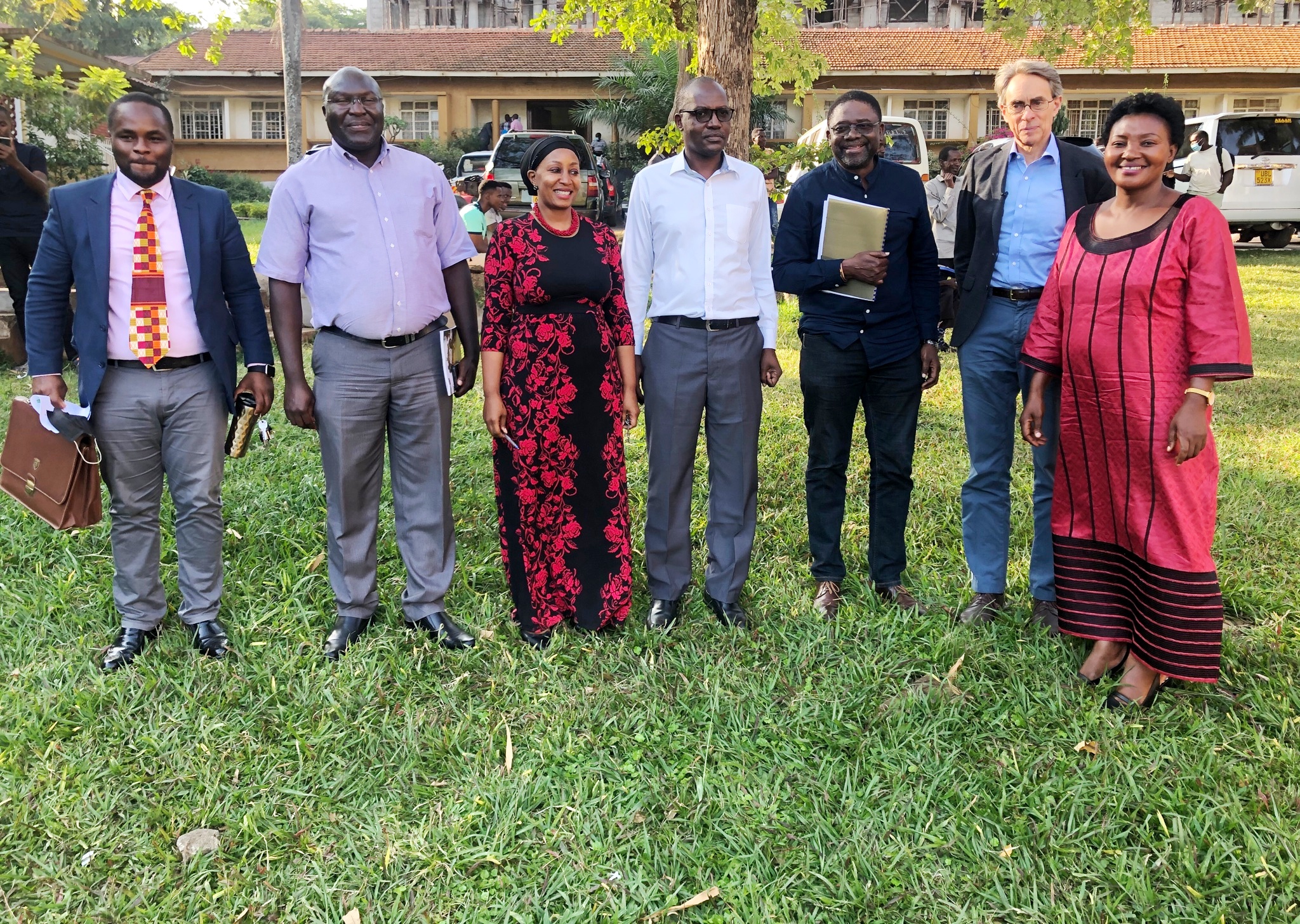
The Human Rights and Peace Centre (HURIPEC) at Makerere University School of Law (SoL) has pledged to continue research on human rights and document its violations in Uganda. This pledge was given by Dr. Zahara Nampewo, Director – HURIPEC at a symposium jointly organised by HURIPEC and Human Rights Watch (HRW) held on the 30th June 2022 at Makerere University. The Symposium titled ‘Rule of Law and Barriers to Accountability for Unlawful Detentions: Challenges and Opportunities’ was attended by Diplomatic Corps, Civil Society representatives,Politicians, Government Officers, Academia, Researchers, Students and the general public.
The symposium was moderated by Professor Joe Oloka-Onyango, Faculty at the SoL. In his introductory remarks he quoted a report, ‘Uganda: The failure to safeguard human rights’ published by Amnesty International in 1992. The report examined the human rights record of the NRM government which had come to power in 1986 after gross human rights by previous governments. The report had concluded that ‘Despite some improvements regarding human rights, arbitrary arrest, illegal detention, torture (including rape) and summary executions by government forces continue to be reported and that the perpetrators are rarely brought to justice. Government critics, e.g. political leaders and newspaper editors, have been charged with offences such as sedition or treason, apparently for political reasons’. Professor Oloka-Onyango noted that 30 years later we are still discussing the question of unlawful detentions and human rights violations. He thanked HURIPEC and HRW for organising the event to allow participants to exchange views.
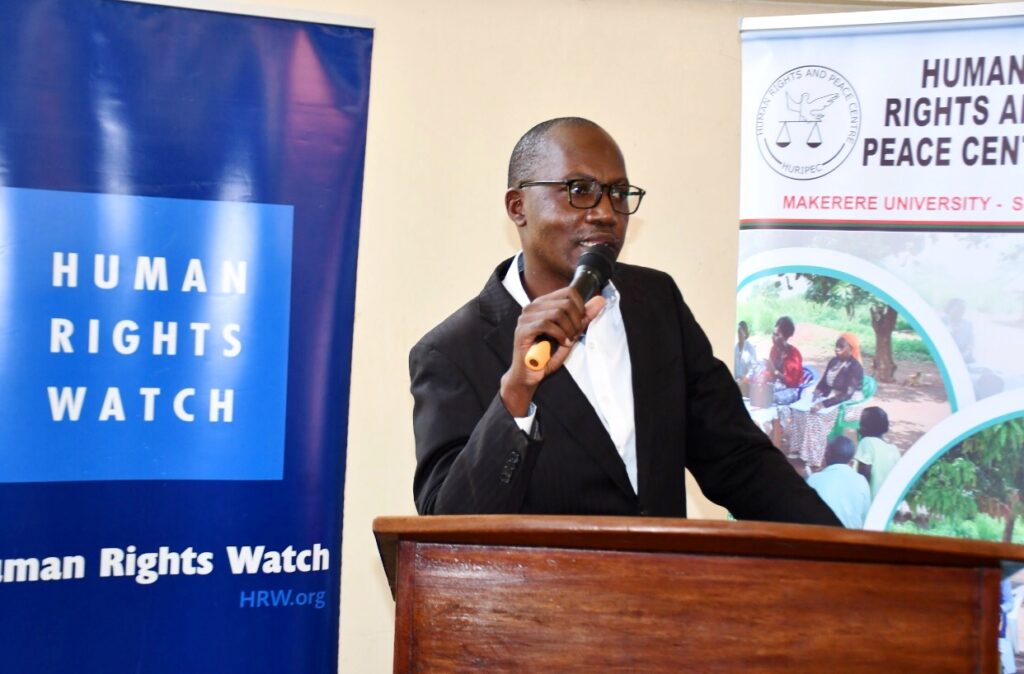
Professor Christopher Mbazira, Principal – SoL welcomed participants to the SoL and symposium. He thanked HURIPEC and HRW for organising the event noting that such partnerships proudly make SoL outstanding in the country, region and Africa continent.
Professor Mbazira added that ‘Uganda is currently defined as a country with repressed civic space where the population don’t share ideas freely’, He added, ‘Universities serve as civic spaces where people are able to share ideas. Makerere has many departments and colleges but its only SoL that provides civic space to promote human rights at the moment which I think is a mandate for academic institutions. I therefore urge and encourage other units to pick the baton’.
The Deputy Vice Chancellor – Academic Affairs, Professor Umar Kakumba represented Makerere University Management at the symposium. In his remarks, he warmly welcomed participants to Makerere University conveying greetings from management, particularly this centennial year when the institution is celebrating 100 years of existence. He reiterated the role of Makerere in transforming societies through its human capital and research output, adding that it is aligned to the reason we are convened here today to listen to work accomplished by HURIPEC, SoL and partners.
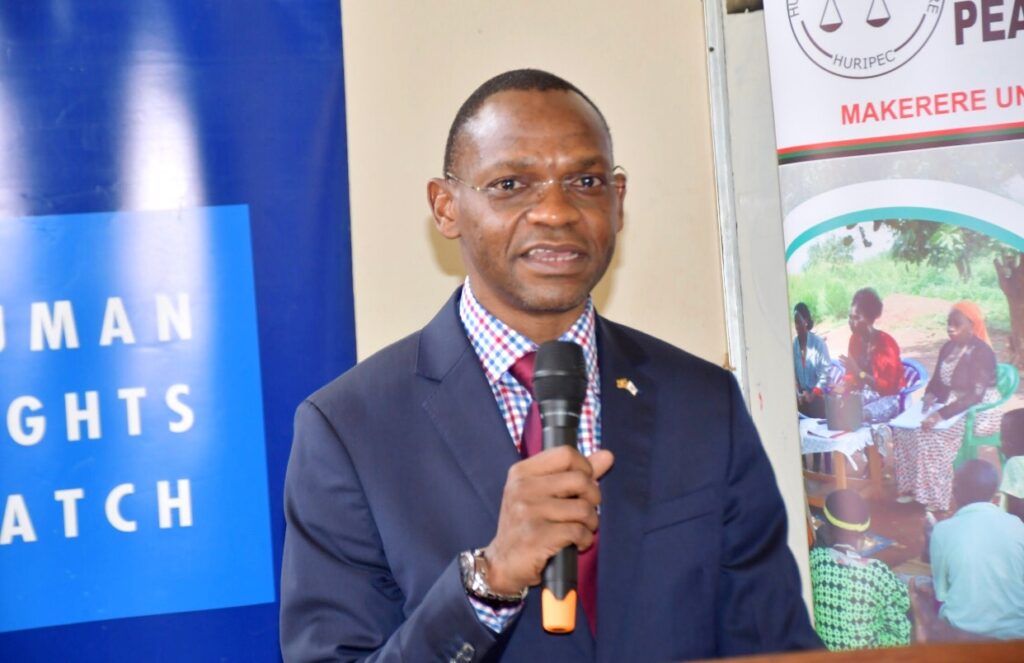
Professor Kakumba noted that Makerere’s history has been punctuated with upheavals linked to politics in Uganda. ‘The topic before us could not have been more timely now and even in the past. For many years after independence, Uganda saw a record of unlawful detentions and torture, many of which unfortunately ended in disappearances and death. Makerere was not spared losing our first Vice Chancellor, Frank Kalimuzo who reportedly was detained and killed on the orders of then President, Idi Amin Dada’. This marked the first attack on intellectualism and independent thinking in Uganda.
The Deputy Vice Chancellor highlighted that universities have a two-pronged role to play in human rights protection; first, human rights education which translates to public debate and opinions because of the autonomy as well as academic freedom of universities. Secondly, research output necessary for educating the next generation of policy and service providers, alongside objective evidence and reviews of current governmental policy. Professor Kakumba commended the School of Law in particular the Human Rights and Peace Centre for continuing to support the teaching of human rights law at Makerere. He further added that ‘as Makerere University, our strategic focus is to be a research-led institution, to provide relevant empirical data to the government and other key actors to guide the country’s policy and development agenda’.
Professor Kakumba explained that he hopes that the discussions here will trigger debate to shape policy on freedom from unlawful detentions.He wished the participants fruitful deliberations and thanked the School of Law, the HURIPEC team for always spearheading research on key legal, human rights and governance issues that always puts Makerere ahead of competitors. He assured the School of the support from University Management.
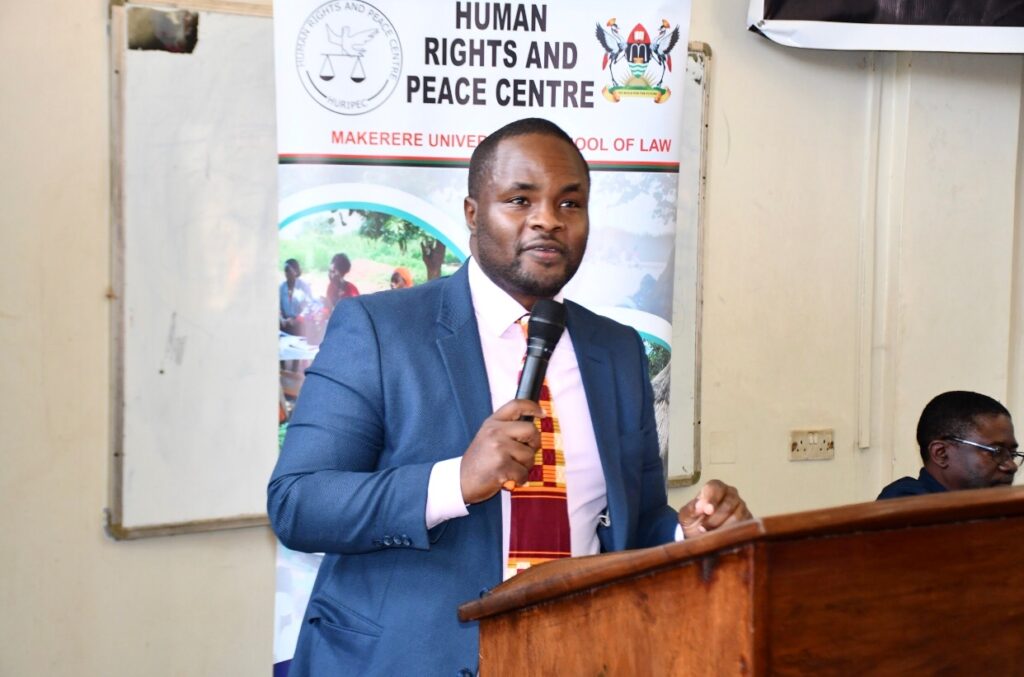
A keynote speech was delivered by Dr. Busingye Kabumba, Lecturer – SoL. His speech delved into the jurisprudence of liberty. Dr. Kabumba traced a history of documenting liberty quoting the US Declaration of Independence and French Constitution when the Monarchy was deposed. Coming closer to home, he explained that Article 23 of 2005 Uganda Constitution is about protection of personal liberty and a bill of rights is defined; however, while these are written the reality is different.
Dr. Kabumba Busingye added that its demoralizing that when colonialism ended and power handed over to African leaders, the leaders have been harsh. ‘Despite independence and declarations of liberty, the reality is hollow. Nationals are born in captivity and die in captivity in “open air prisons”’ he added. He highlighted laws that support unlawful detentions still in existence on the Uganda books of law like the Law of Idle and disorderly. In such instances, the arresting officer is the determinant of the wrong committed by the offender. Dr. Kabumba Busingye noted that because of unlawful detentions, prisons are full and more are required. He added that there are recent changes happening in the judicial system which will further affect civil liberties in Uganda for example high bail rates, appointment of acting judges among others.
‘Once you are in illegal detention, you are in no-man’s land, where anything can happen. We should be conscious of various forms of unlawful detentions’
‘There is a range of offenses targeting poor persons or political opponents; these are used to clean streets of undesirables. The person arresting you determines the offense’
Dr. Busingye Kabumba
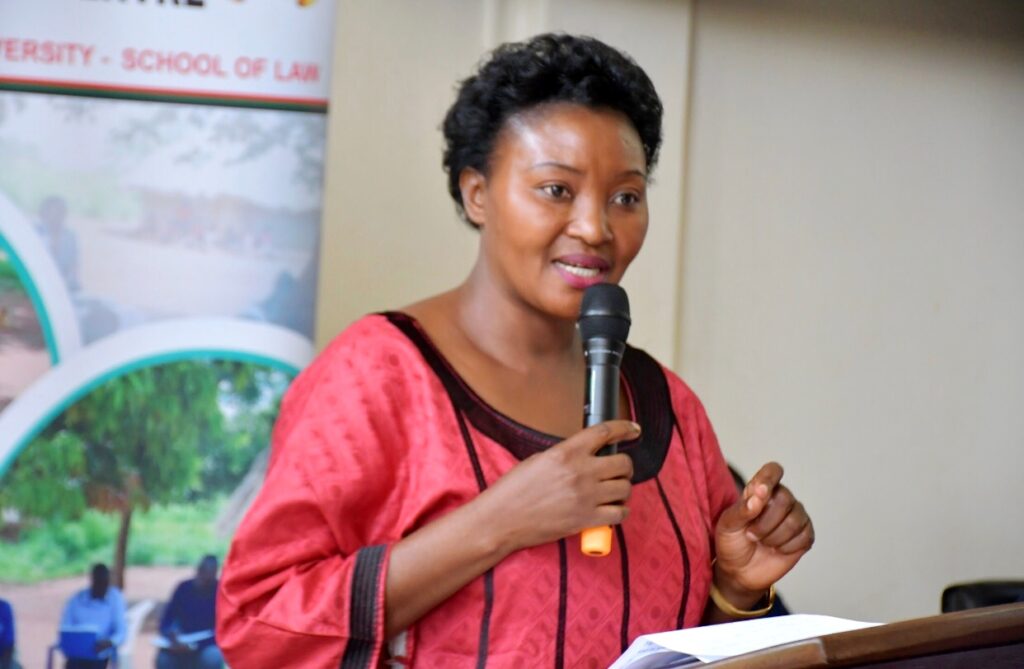
Hon. Winfred Kiiza, former Leader of Opposition in Parliament; Dr. Zahara Nampewo, Director – HURIPEC and Mr. Kenneth Roth, Executive Director – Human Rights Watch constituted a Panel to discuss accountability for unlawful detentions by government institutions. Brigadier General Felix Kulayigye, spokesperson of the Uganda People’s Defence Forces (UPDF) had been invited and accepted to join the Panel but he was unable to attend the symposium.
Hon. Kiiza thanked SoL and HURIPEC for inviting her to attend and speak at the symposium, an opportunity for knowledge sharing. She re-echoed the first stanza of the Uganda National Anthem where one of the lyrics is ‘United, free for liberty together we’ll always stand’. She wondered whether Ugandans are actually free.
‘If liberty and freedoms were protected would we be here to discuss unlawful detentions’
‘Bad laws will eventually catch-up with everyone, all people of conscience must rise up to defend the law and human rights. Even those perpetrating unlawful detentions are captives of they serve’
Hon. Winfred Kiiza
Hon. Kiiza stated, ‘everyone is expected to follow the law where the expectation is thatthe law is fair, but is it’. She thanked SoL and HURIPEC for organising the discussions because it has become so difficult to share knowledge. She called for accountability of leaders at all levels adding that we are in a situation of ‘rule by law not rule of law’.
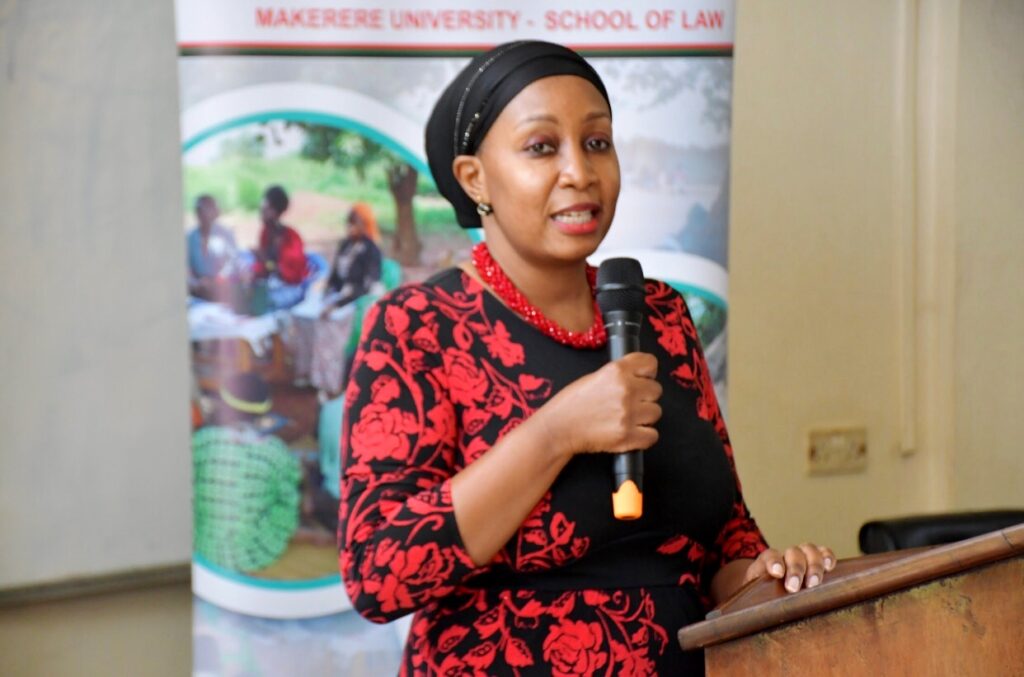
Many issues are interconnected with unlawful detentions but ‘Ugandans have a tendency of normalizing situations, consider the rising prices of fuel (diesel is more expensive than petrol which was unseen before)’, Dr. Zahara Nampewo highlighted. She added that previously, there was a presidential acknowledgment of unlawful detentions where he said, ‘security agencies were arresting perpetrators of terrorism and insecurity, talk of unlawful detentions should be ignored because that can’t happen under the government of National Resistance Movement (NRM)’. Dr. Nampewo also shared summary of the report, ‘Human Rights Violations in Uganda: The Abuse of Civil and Political Rights in the Era of Kisanja Hakuna Mchezo’. The report was produced by HURIPEC to audit observance of human rights in the era of ‘Kisanja Hakuna Mchezo’, President Museveni’s term 2016-2021. The research findings concluded that violations of political and civil rights continued to occur in the term. Some of the violations highlighted included: excessive use of force by security agencies leading to injuries and deaths, detention beyond 48 hours, disappearances to unknown detention places, extra-judicial killings, torture and degrading treatment.
‘Strongman syndrome exists in Uganda where officers posture themselves to be above the law. The strongman syndrome has enabled powerful individuals to issue orders even in contravention of the law. These strongmen are able to use the system for their personal interests.’
Dr. Zahara Nampewo
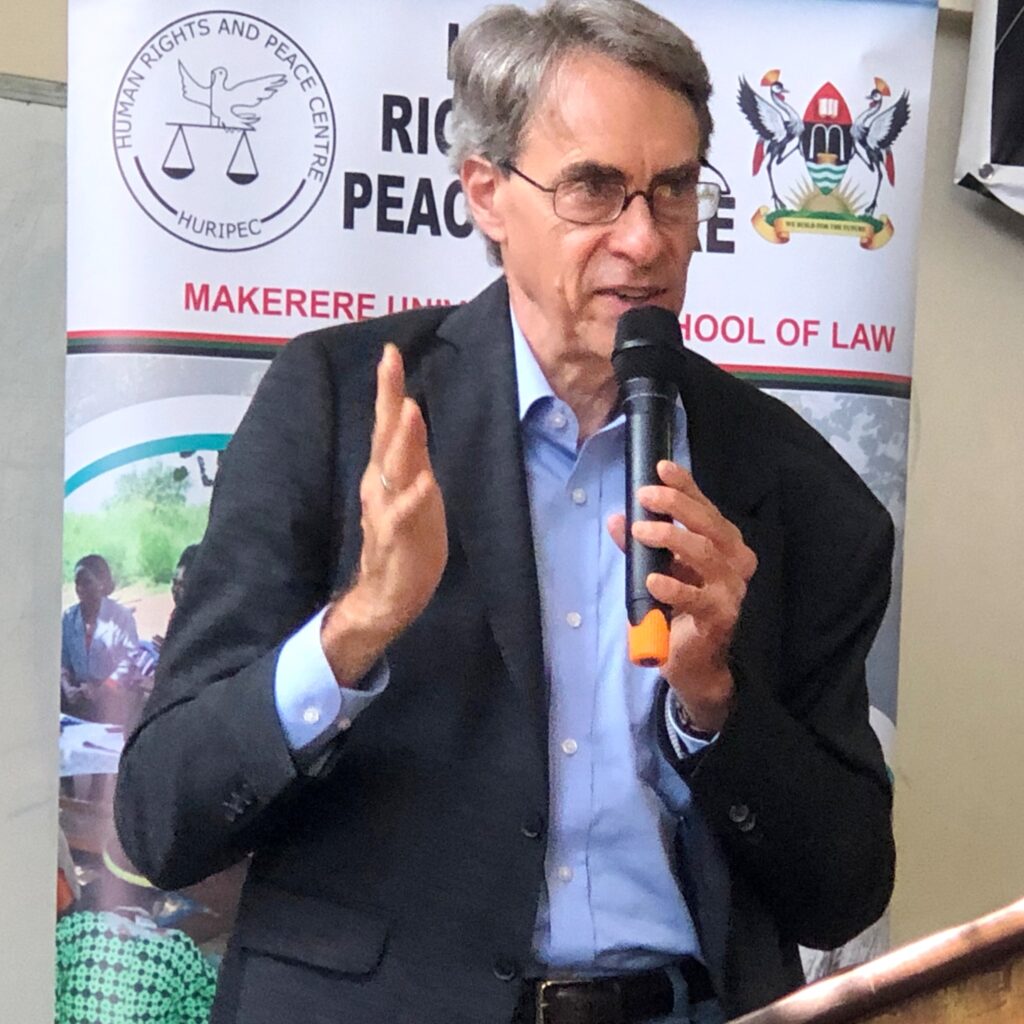
Mr. Kenneth Roth shared what transpired in a meeting that HRW had held with His Excellency, President Yoweri Kaguta Museveni to share their report on the status of Unlawful Detention and Abuse in Unauthorized Places of Detention in Uganda titled, ‘I Only Need Justice’. Issues discussed included Human Rights Protection Act; holding government accountable;proposed human rights defenders law; persecution of civil society in Uganda through the changes instituted in the NGO law;attacks on press members; Facebook shut down among others. The President promised to review the issues raised.
‘The issue of unlawful detentions takes both a criminal and political dimension especially with Internal Security Organisation (ISO). People were picked up and disappeared. There were also reports of people beaten, raped and tortured with them being extorted for release’.
– Mr. Kenneth Roth
A number of issues were raised during discussions:
- The four ‘I’s affecting human rights in Uganda were given as: Impunity by security and government personnel;Institutions and their collapse; Information and documentation of human rights violations as evidence for future reference and Implementation of laws and guidelines.
- The role of the international community in holding the government accountable for violations.
- Resilience and response mechanisms by the population.
- The appointment of NRM cadres as judicial officers and in human rights institutions which affects objectivity and impartiality required in justice.
- Partnerships are required in fighting human rights violations, no one or institution can solve the problem alone. Consider development of a strategic plan to bring all parties on table to work together.
- Ugandans are suffering from collective Post Traumatic Stress Disorder (PTSD) due to the abuse and violations suffered. The end might be very bad for the country.
- Vicious cycle of abuse of state power from colonial time to subsequent governments in Uganda since independence.
- Torture, fear and intimidation affecting population, media and others players in the country.
- HURIPEC has to organize other meetings like the symposium to continue sharing knowledge on human rights violations and unlawful detentions.
- The civic space in Uganda continues to narrow and hopefully academic institutions can help close the gap.
The organisers of the symposium, HURIPEC and HRW promised to share a detailed report of the meeting.
The symposium was closed by Professor Christopher Mbazira, Principal SoL. He thanked HURIPEC and HRW for organising the Symposium. He also thanked the audience assuring participants that SoL will continue to be a safe civic space.
‘The culture of impunity has become more entrenched; Courts are mobbed not to grant bail or make certain decisions, people holding public offices are mobbed to grant favours, inconsistent with procedures of the law’
Professor Christopher Mbazira
You may like
-
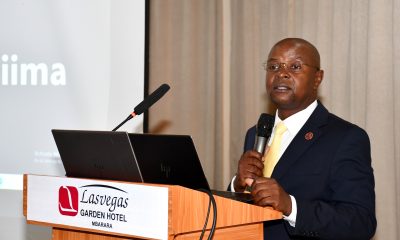

Building Skills for Better Public Investments: PIM Centre Trains Public Sector Economists
-


From Adversity to Excellence: The Inspiring Journey of Makerere’s Best Science Student, Esther Ziribaggwa
-
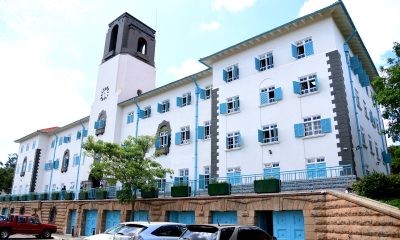

US$ 162m KEXIM Loan Approval Timely for Makerere University
-


JNLC-JICA Symposium advocates for Inclusive Governance: Amplifies debate on revisiting African-style Governance
-
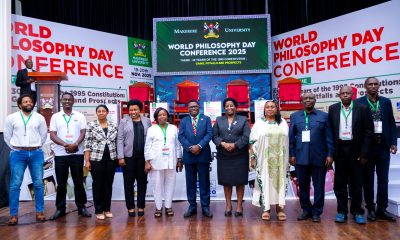

Hon. Mao Urges African States to Institutionalise Accountability in Governance
-
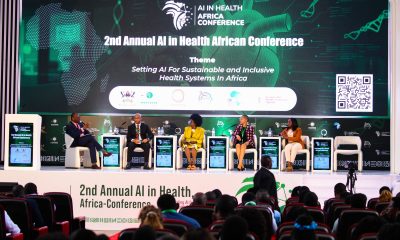

Government of Uganda reaffirms commitment to AI-Driven Innovation in Health and Development
Law
Disclaimer Notice: LLB Pre-Entry Examination
Published
2 months agoon
January 5, 2026By
Mak Editor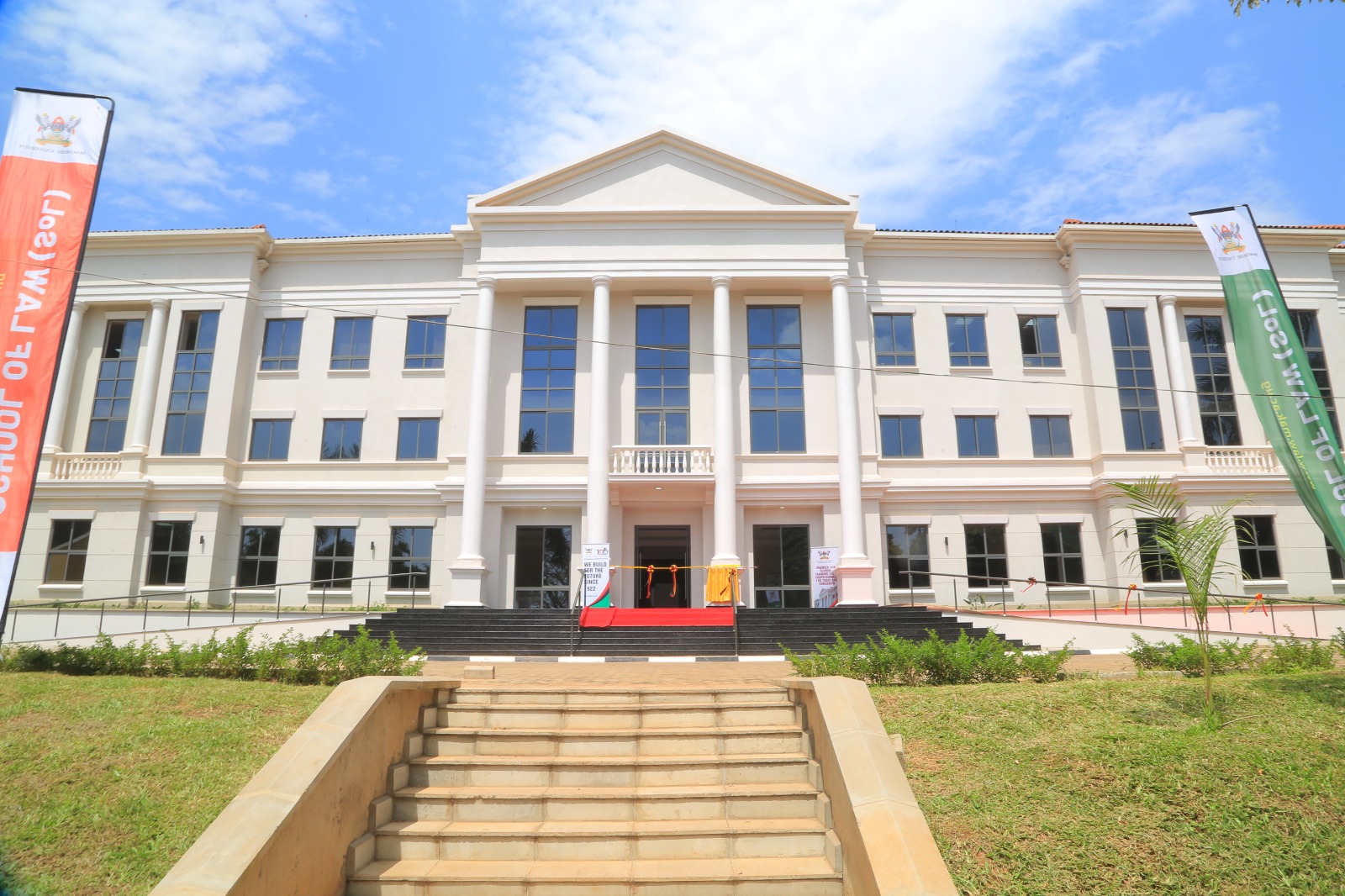
The Management of Makerere University School of Law (SoL) has noted with concern a communication circulating regarding a purported Bachelor of Laws (LLB) programme pre-entry examination coaching and training scheduled to commence on 5th January 2026 at SoL Main Building.
No such training has been approved, sanctioned, or authorized by the School of Law. The SoL does not and will never conduct such trainings. The individuals behind the advert are fraudsters. You contact them at your own risk.
Ronald Naulwairo, PhD
DEAN
Law
Justice Egonda Urges Makerere Scholars to Lead Constitutional Review, develop National Scorecard for Public Office Performance
Published
3 months agoon
November 20, 2025By
Zaam Ssali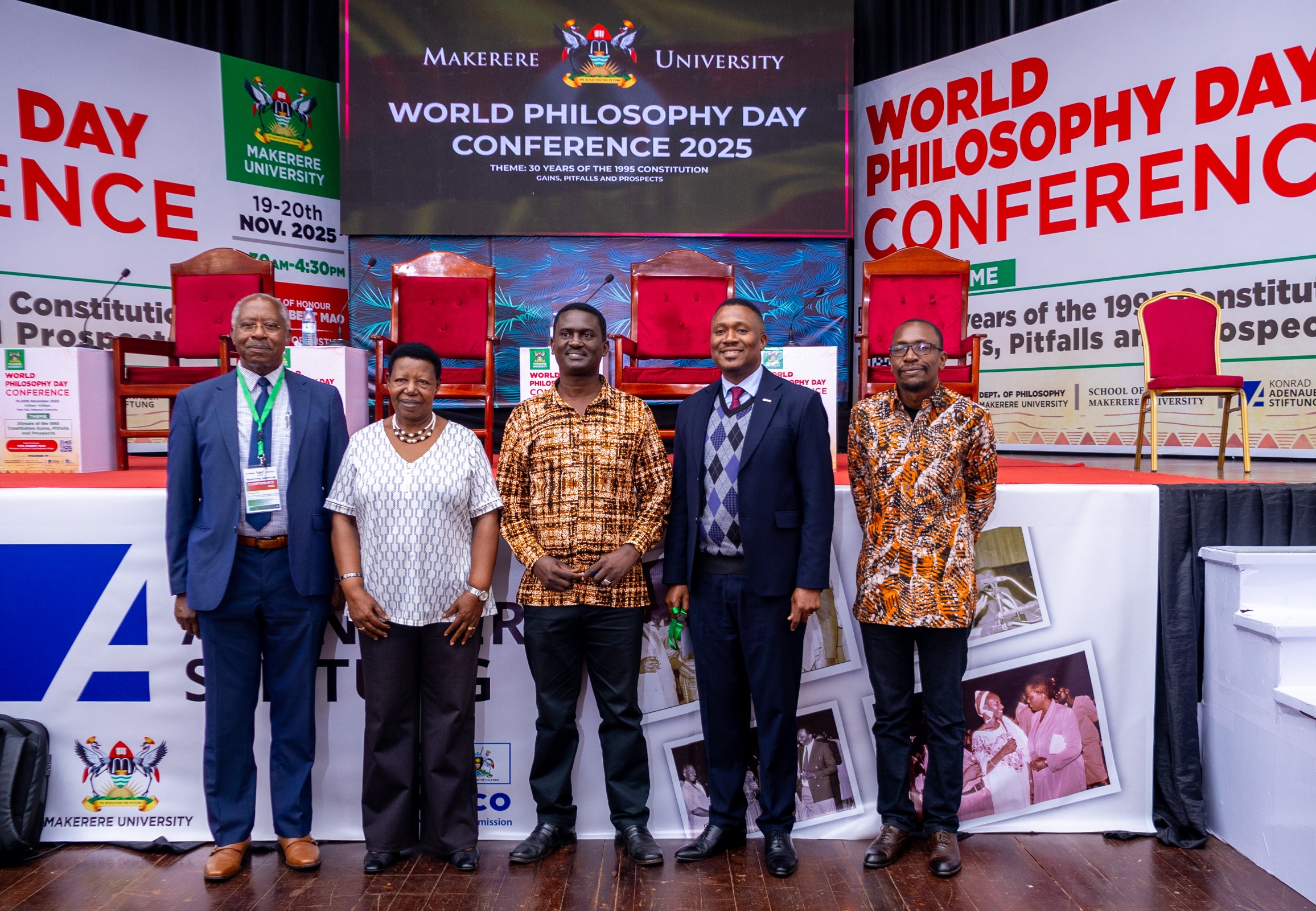
By Zaam Ssali and Jane Anyango
Kampala, Nov. 20, 2025 – Justice Egonda urged Makerere University scholars to spearhead a thorough review of Uganda’s 1995 Constitution and to design a national scoreboard to evaluate constitutional office holders. He said academia—particularly the School of Law—should draft a model constitution to guide national discussions on governance and judicial independence.
Court of Appeal Judge, His Lordship Martin Stephen Egonda made the call delivering a keynote address at a conference to commemorate the World Philosophy Day at Makerere University on 19-20 November 2025.
Justice Egonda warned that Uganda’s constitutional order is deteriorating requiring urgent reforms, urging academia to take lead. He called for two major initiatives: a comprehensive review of the 1995 Constitution and the creation of a national performance scoreboard to evaluate the performance of constitutional officeholders. Egonda argued that universities have the expertise to guide constitutional reform, design a model constitution, and generate independent performance data to strengthen accountability.
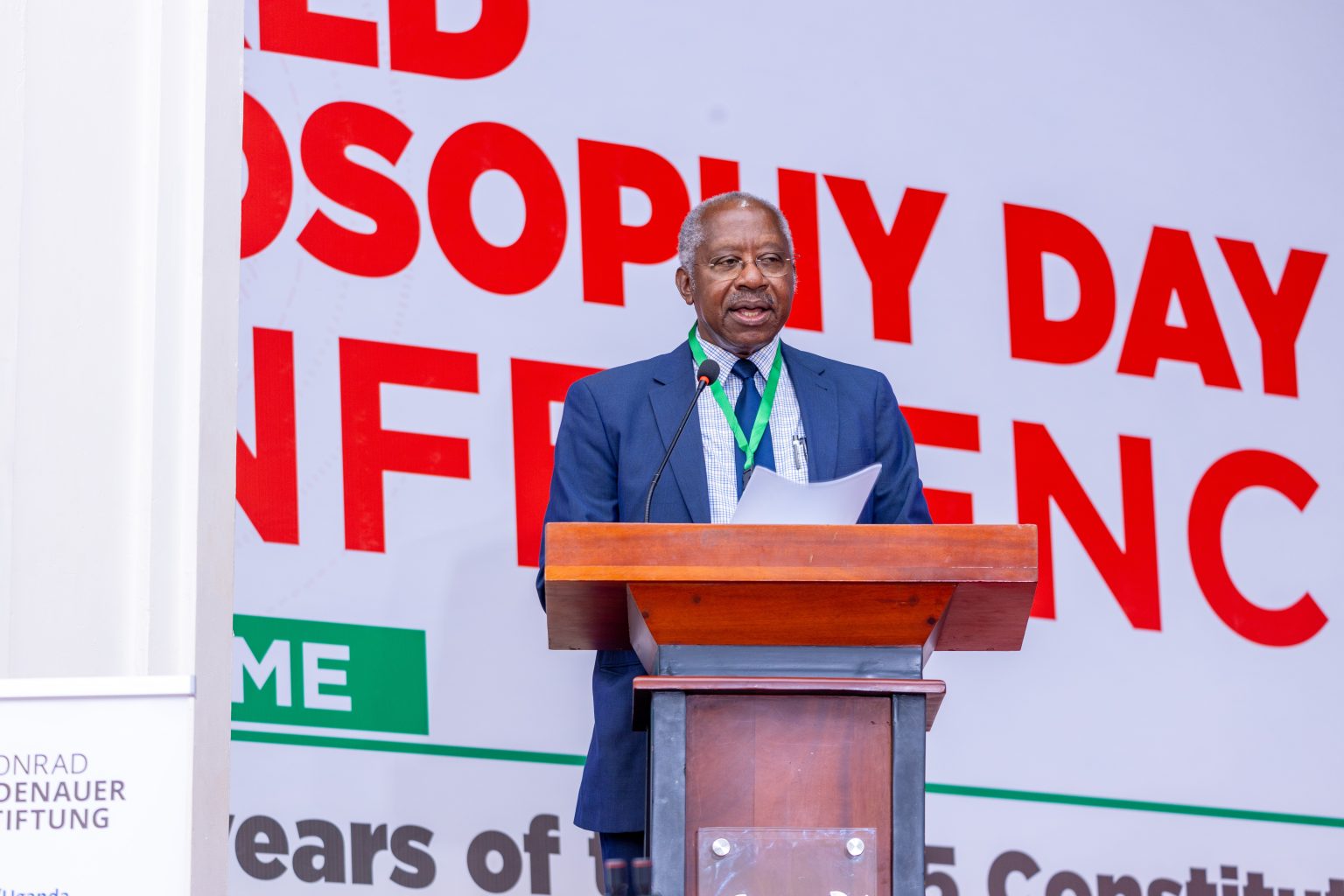
He also called for clear, measurable indicators to assess judges’ and public officials’ performance, noting that current Judiciary reports lack qualitative depth. He advised that Universities can provide independent data and constitution-based metrics. He stressed that such a scoreboard would create awareness about compliance with constitutional obligations, fight abuse of public trust and defend the Constitution by promoting obedience to constitutional mandates. “To sum it up, it would be an act of exacting accountability from holders of constitutional and public offices,” he said.
Justice Egonda cited serious constitutional failures—especially within the Judiciary—highlighting extreme delays in criminal appeals where some inmates completed long sentences before their appeals were heard. He highlighted the systemic dysfunction in case management, unreliable digital judicial systems, leadership vacuums in the Judiciary.
Justice Egonda highlighted a recent judicial review in Kabale, where the Deputy Chief Justice held an open session with stakeholders. A representative from Ndorwa Main Prison reported that 20 inmates had waited months for High Court judgments, with no mechanism to address the delay. Initial checks of the judiciary’s computerized management system showed no pending judgments. However, after updating records following the prison’s submission, officials confirmed the existence of stalled criminal cases and pending judgments, particularly due to transfers of trial judges.
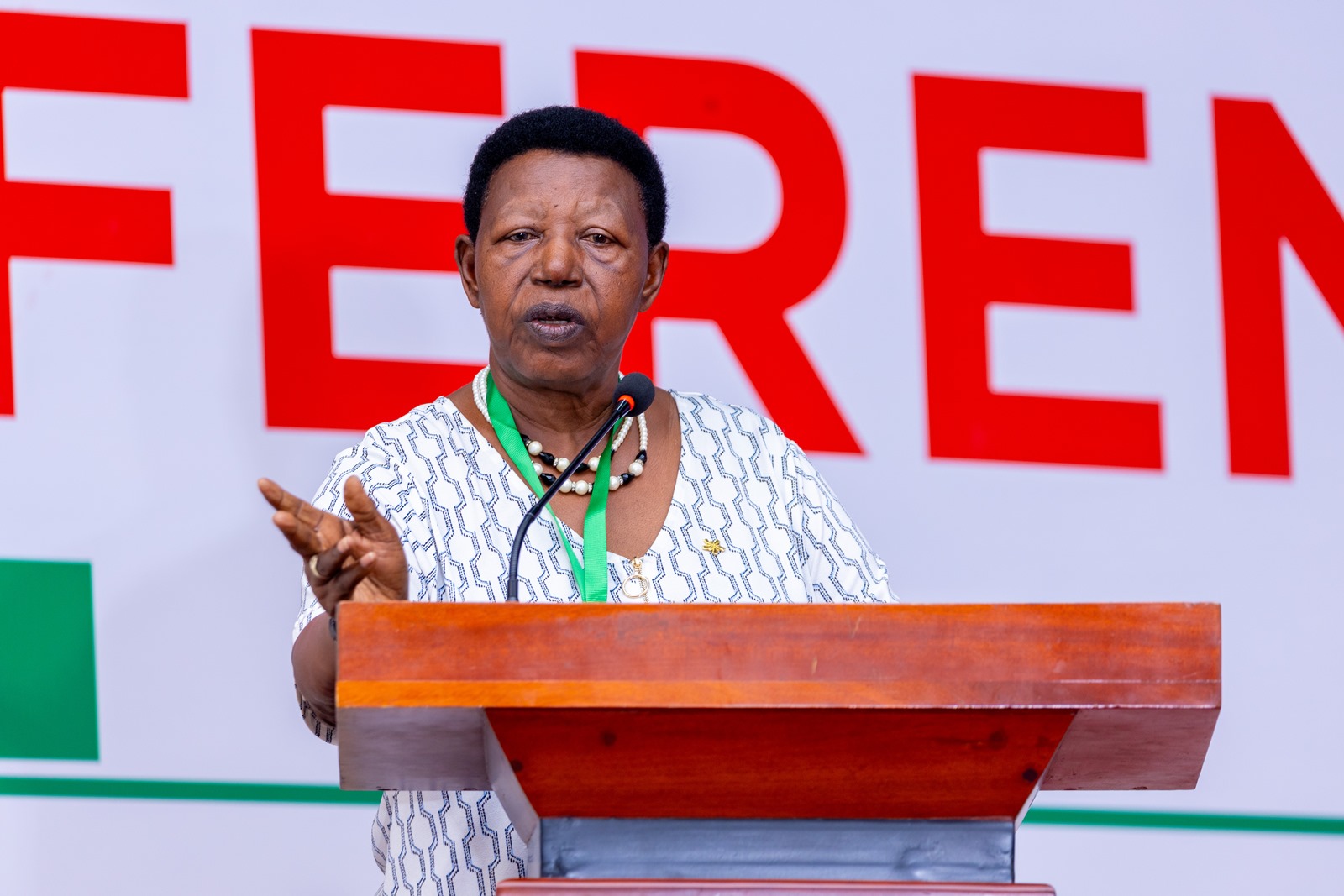
Panelists responded with broader reflections. Dr. Miria Matembe warned that Uganda now has a “constitution without constitutionalism,” arguing that power has been captured and constitutional safeguards eroded, including Parliament’s independence. She urged citizens to reclaim constitutional power, confront corruption, and defend truth even at personal cost.
Professor Chris Mbazira praised Egonda’s condor but emphasized that constitutional reforms alone are inadequate without accompanying political transformation. He said Uganda’s hybrid regime—where informal power overrides formal institutions—must be dismantled for true constitutionalism to take root.
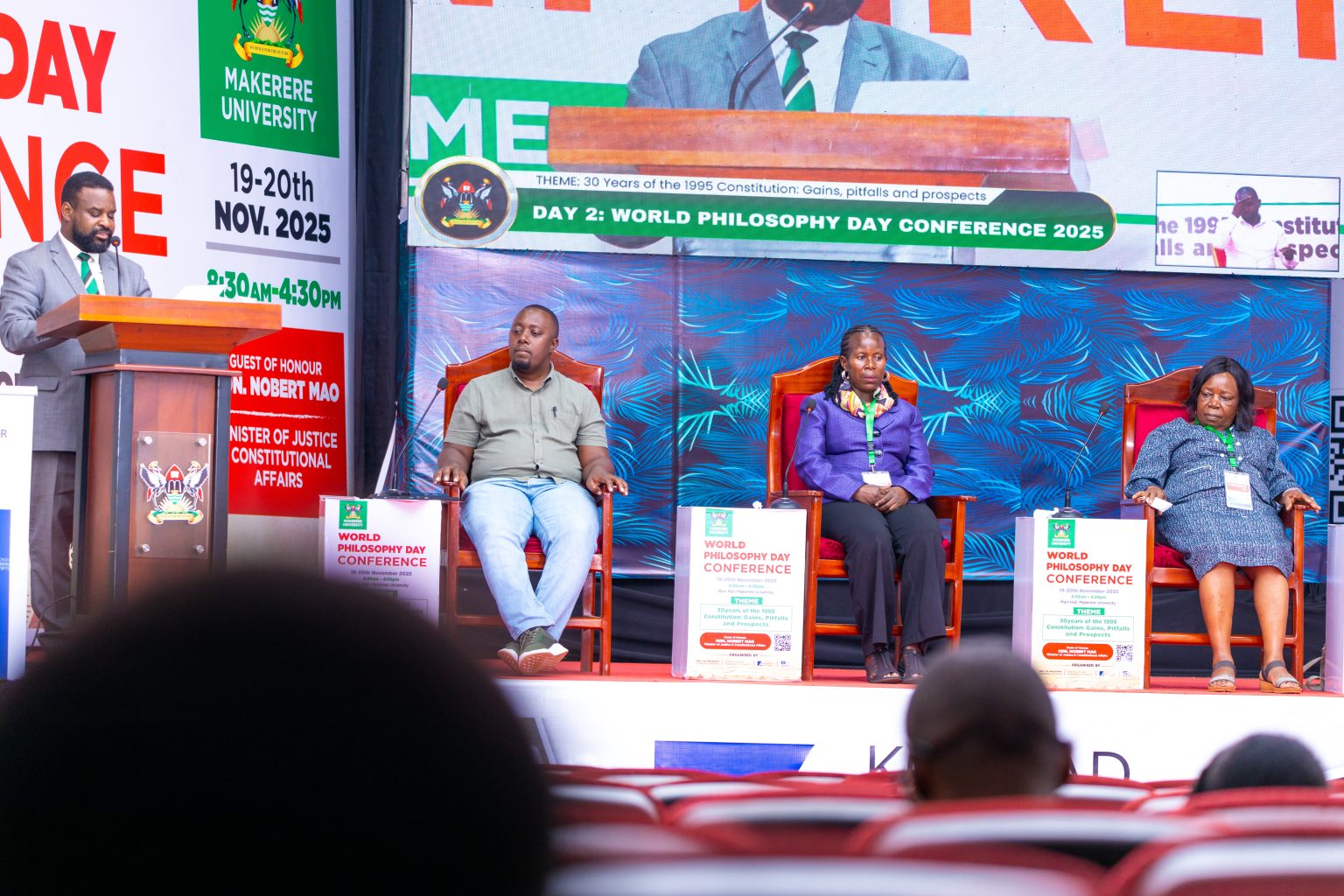
Former Constituent Assembly delegate Hon. Loice Bwambale urged Ugandans, especially youth, to take responsibility for preserving constitutional gains and addressing unresolved issues such as regional representation and land questions. She called for election of principled leaders, civic engagement, and careful review of entrenched constitutional provisions tied to public participation.
Overall, the plenary discussions underscored that restoring constitutionalism in Uganda requires institutional accountability, political reform, citizen activism, and renewed respect for constitutional principles. Specific issues raised during discussion included:
- Accountability necessary for elective positions and offices
- Introduction of term limits for all elective positions
- Ugandans have been conditioned to accept a mediocre leadership model
- The elites including researchers and academia advised to inspire the general population to get involved in constitutionalism
- Sensitization and civic education for members requiring more information. It was noted some
- members have given up hope for any change
- A National dialogue for all Ugandans. The recommendations be cascaded to the population
- and for appreciation by the population who think constitutionalism doesn’t concern them
- Reflect the disintegration of our neighbours like Sudan for lessons to Ugandans
- Commitment by the leaders to hand over power peacefully
- Each of us ask what role everyone can play
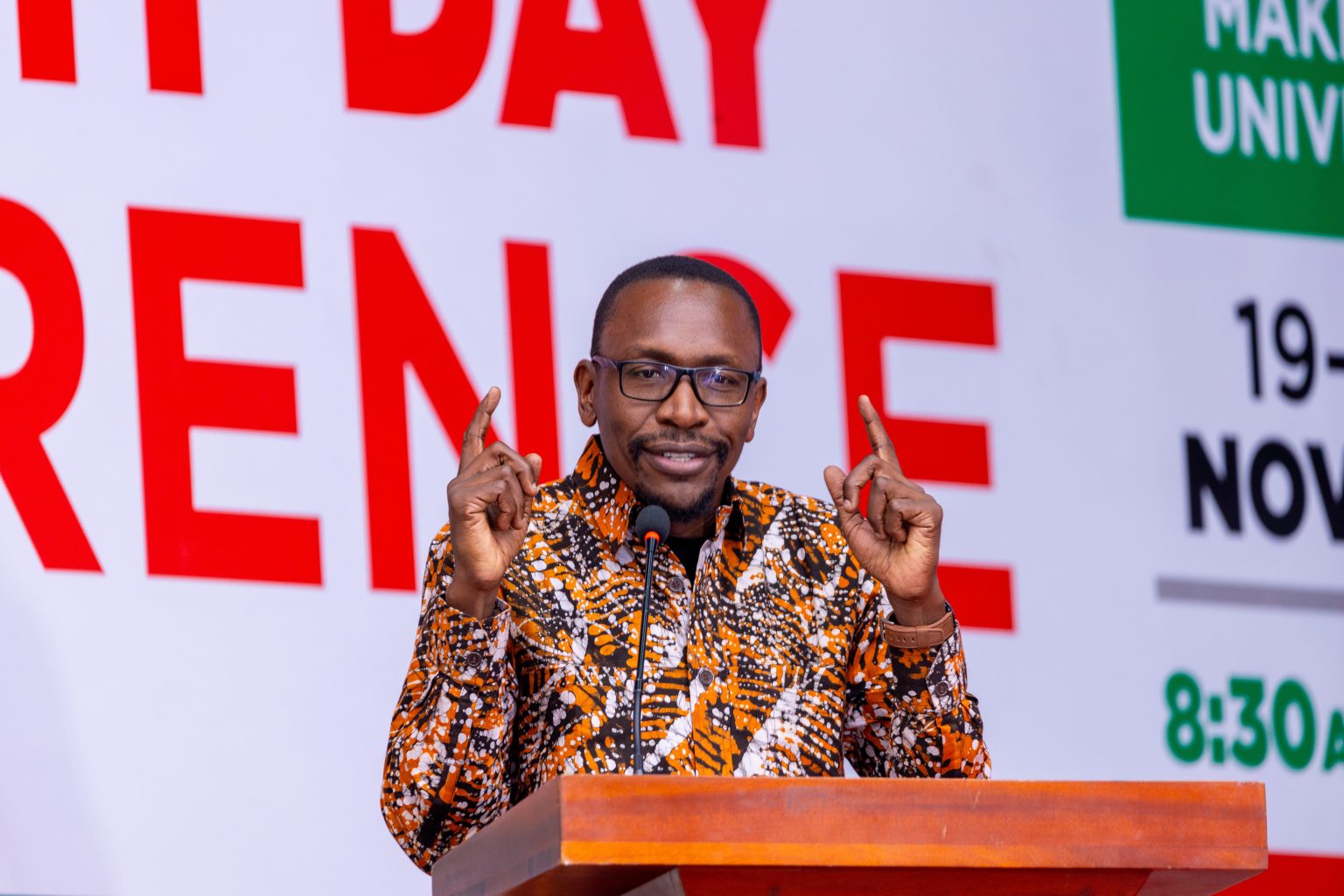
The 2025 World Philosophy Day conference at Makerere University concluded with strong calls for renewed constitutional reflection, ethical leadership, and civic responsibility as Uganda marks 30 years of the 1995 Constitution.
Delivering closing remarks, UNATCOM’ Dr. Pauline Achola, emphasized philosophy’s role in promoting peace, ethical reasoning, and sustainable development. She urged continued examination of the constitution’s gains and gaps and reaffirmed UNESCO’s commitment to
supporting commemoration of the World Philosophy Day dialogue in Uganda.
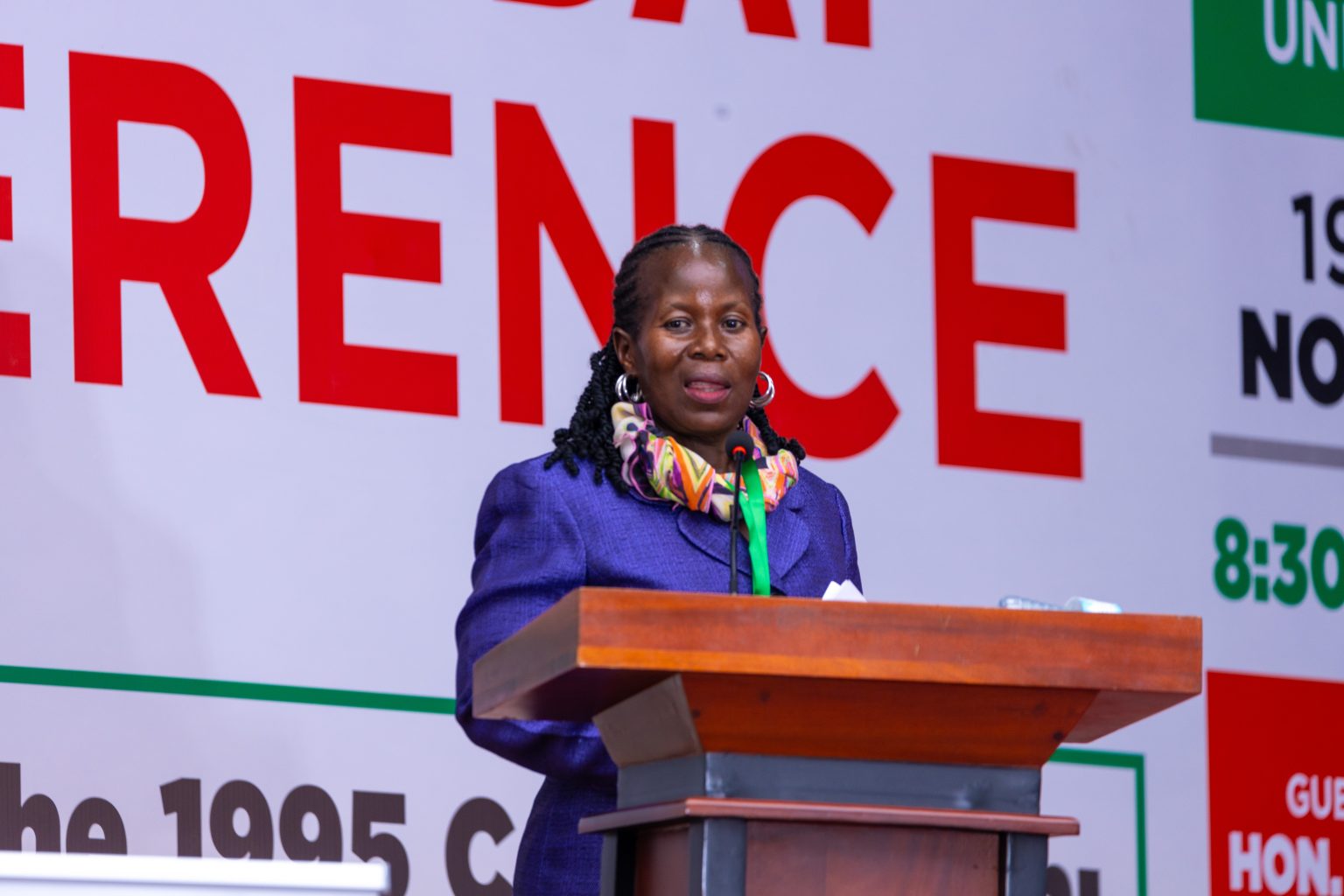
In his speech, Bernard Nkone of Konrad Adenauer Stiftung highlighted major achievements under the 1995 Constitution—human rights, separation of powers, gender equality, and civic participation—while warning that challenges such as corruption, political polarization, and limited access to justice persist. He stressed empowering youth to protect democratic values.
Prof. Robert Wamala – Director Research and Innovations, represented Prof. Sarah Ssali -Deputy Vice Chancellor/Academic Affairs Makerere University. Reading her speech, he underscored philosophy’s importance in fostering ethical leadership and active citizenship. He urged participants to translate conference discussions into policy influence and civic engagement.
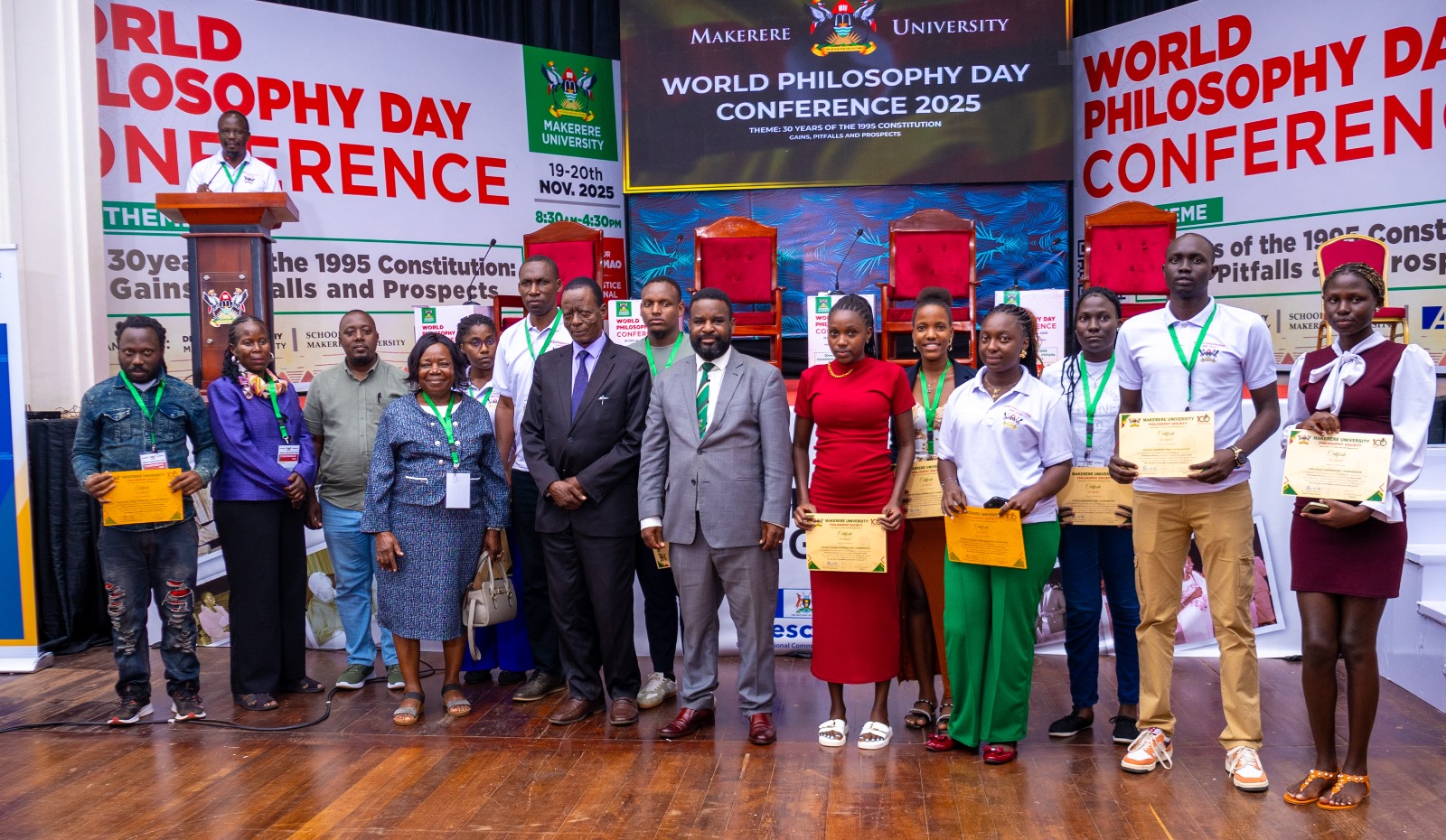
The conference ended with recognition of student representatives from the Makerere University Philosophers’ Society, emphasizing youth contribution in national dialogue.
Zaam Ssali and Jane Anyango are Communication Officers for School of Law & CHUSS respectively.
Law
SoL LLM Orientation 2025: “Keep your Eyes on the Goal” Students Advised
Published
6 months agoon
August 18, 2025By
Zaam Ssali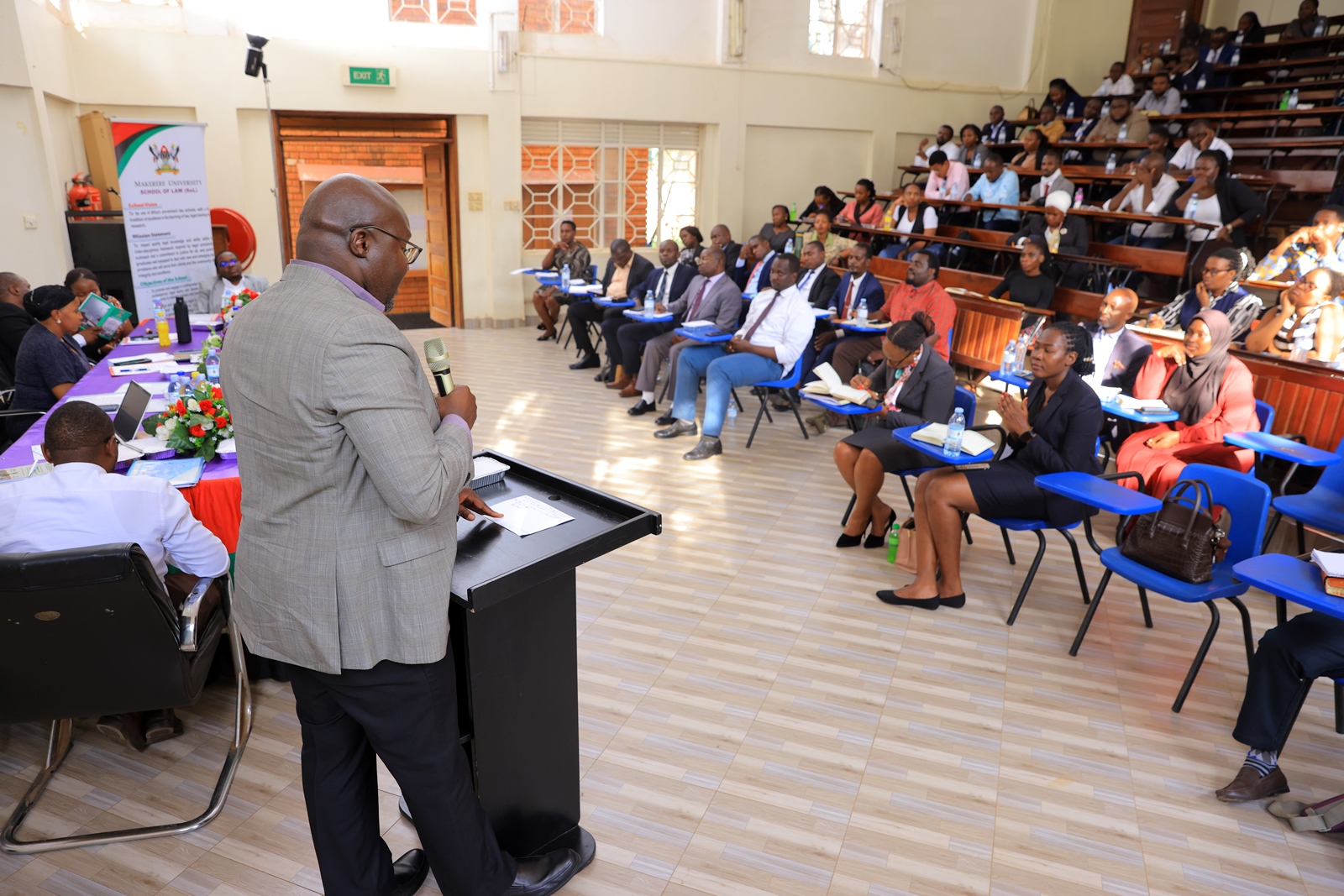
Makerere University School of Law (SoL) held its orientation meeting for the Master of Laws (LLM) 1st year students on the 13th August 2025 in the SoL Auditorium. SoL leadership, Department of Academic Registrar (AR) and Makerere University Directorate of Graduate Training facilitated the meeting.
In his address to the students, Dr. Busingye Kabumba – Head, Human Rights and Peace Centre and SoL Graduate Studies Coordinator welcomed the LLM students to Makerere University and SoL. “I wish to remind you that one plus one equals two, the students must do their bit and we as staff pledge to do our bit. I encourage you to attend classes, handle all assignments on time, and it is my hope that you comply with the University policies”, Dr Busingye Kabumba advised.
He implored the students to hit the ground running and be committed to their studies. “SoL has organised that proposal defence is in year one – semester two so that students have working drafts by year two, this will allow you to finish the programme on time”, he said. Dr. Busingye Kabumba referenced a precedent where a student completed his LLM within one and half years at SoL, which showed that completion in less than two years is possible with commitment.
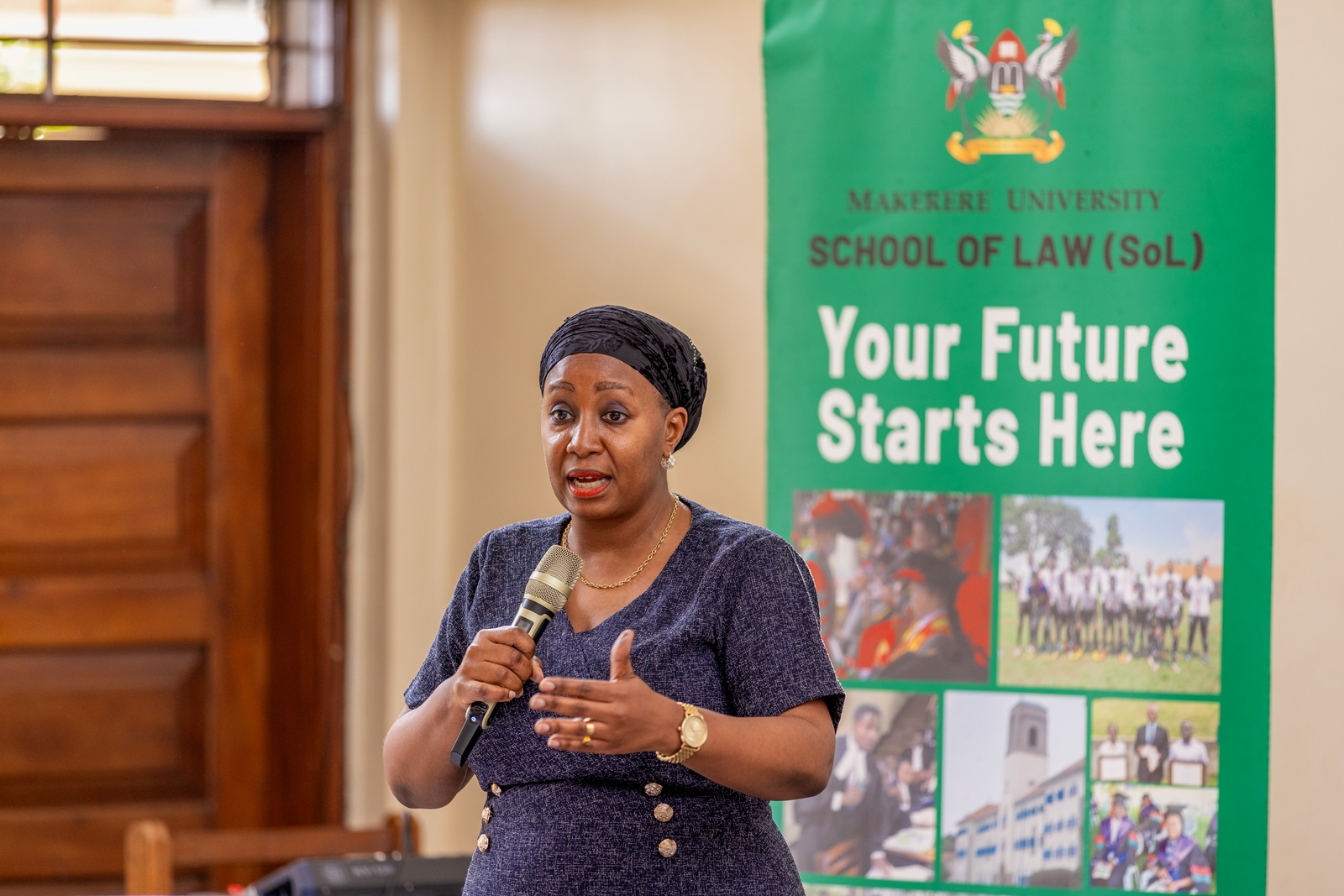
“It is my honour and pleasure to welcome you through the gates of Makerere; I also congratulate you on your admission to LLM, we had so many applicants but we only admitted 124. You don’t choose Makerere but she chooses you. You are lucky to be taught by the legal brains at SoL, all recognized academics in their areas of specialty”, Dr. Zahara Nampewo – Deputy Dean, SoL said in her welcome remarks.
Dr. Nampewo advised the students thus, “This is a 2-year (4 semester) study programme, consider this to be day one of your new story book, you have been admitted in 2025 and it is our hope that you will be graduating in January 2028”.
She further added, “You have your reasons as to why you are enrolling for the LLM and which you wish to fulfill, I therefore take this opportunity to underscore the importance of hard work, determination and resilience. Take the LLM as a full-time engagement, allow us to teach you and help us to help you”.
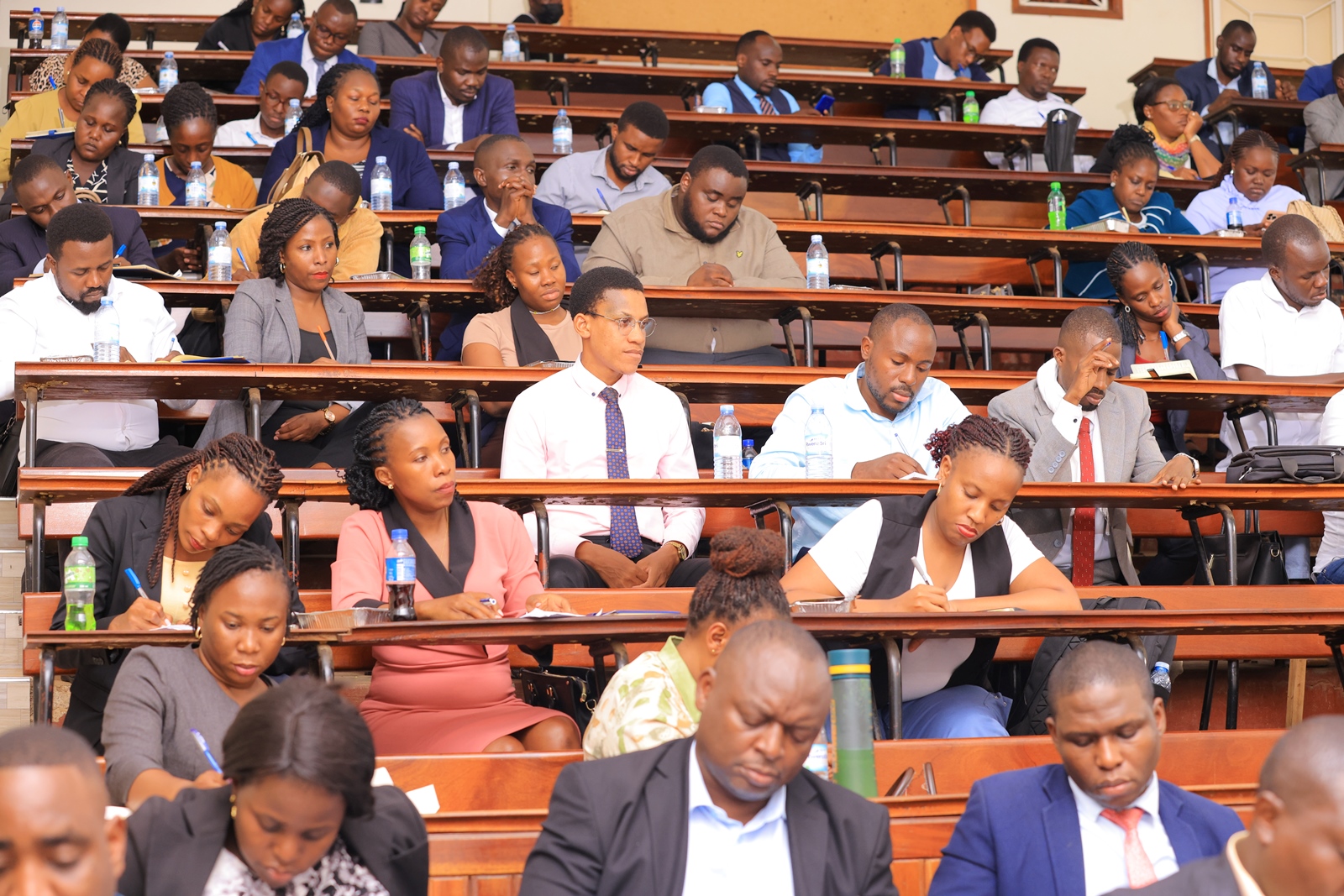
Dr. Nampewo encouraged the students to partake in the various opportunities at SoL besides academics, specifically highlighting the summer schools that students have attended in Europe with support from partners. She also told the students to note that Makerere is a sexual harassment free institution; exclusivity, equal opportunity, gender balance are core values of the University.
Highlighting that SoL has an open-door policy, students were advised to talk to their lecturers for support when challenges arise. “Nothing is insurmountable, every journey starts with a small step”, Dr. Nampewo said.
In his remarks, the Dean-SoL, Assoc. Professor Ronald Naluwairo welcomed the LLM students to Makerere University and congratulated them on the admission to our distinguished LLM programme. He said, “LLM is quiet demanding but doable, a level of commitment and resilience is required. I urge you to attend all your classes”.
Assoc. Professor Naluwairo told the students, regardless of whichever law school you attended for your Bachelor of Laws (LLB), you are now at a Centre of Legal Excellence, work and support one another. “On behalf of SoL, we commit total support to ensure that you succeed in your studies, I also urge you to take responsibility, read and be willing to work”, the Dean advised.
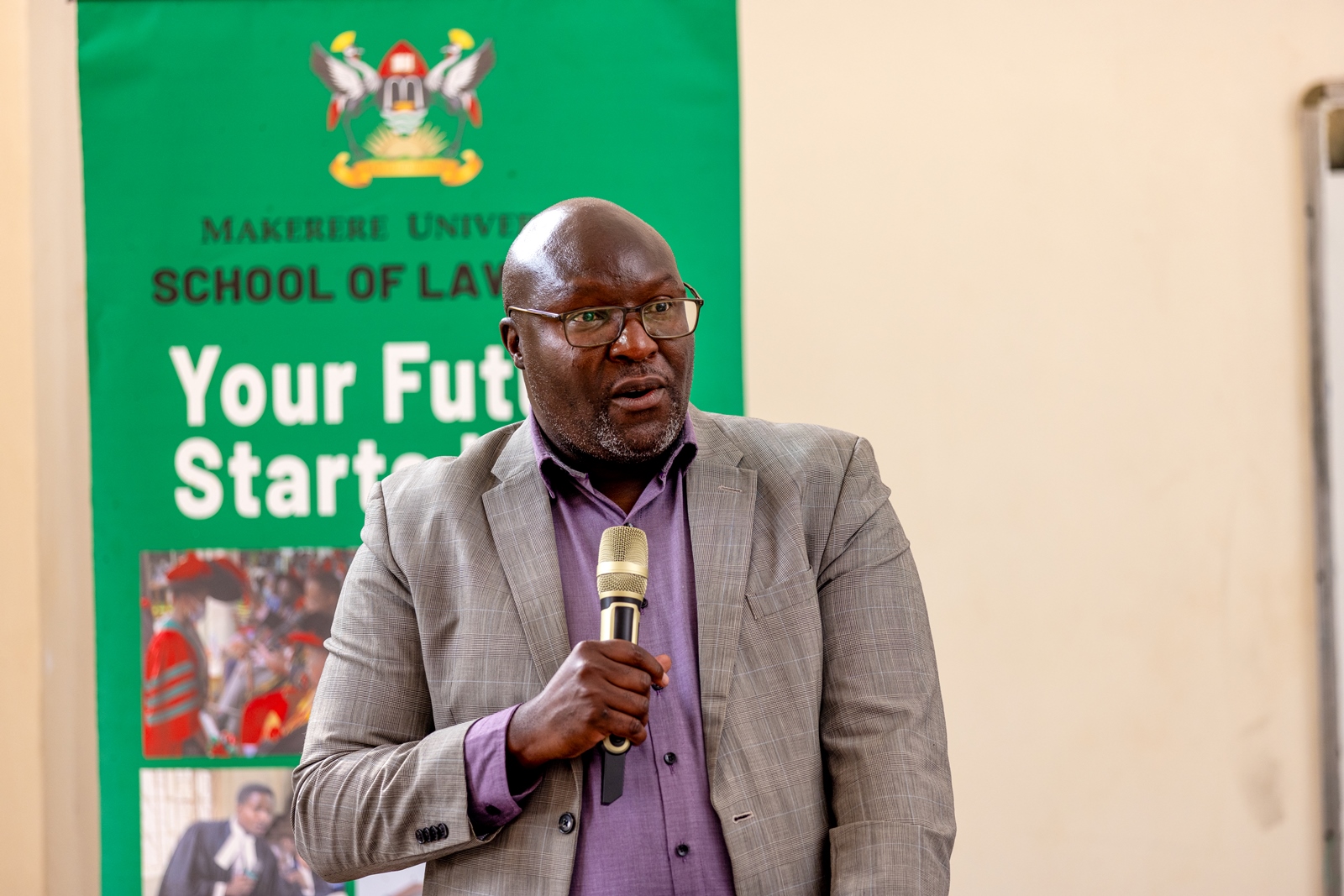
Dr. Mike Barongo, Deputy Registrar in Charge of ICT Division, represented the Academic Registrar’ Department; welcoming the students, he said “this is a great place to be, a premier law school”. He explained to the students what the role of the AR’ Department entails, including application, admission, registration, custody of student records and graduation.
Dr. Barongo highlighted key tasks for new students: activation of students portal, enrolling for recognition as a student, generating payment reference numbers. He advised that where challenges are experienced, the School Registrars are available for support as well as a Support Centre at the College of Computing and Information Sciences (CoCIS) by Makerere University Directorate of ICT.
“Keep your eyes on the goal of why you are here, leave with a master’s degree”, Mr. Laban Lwasa, SoL Registrar told the students. He congratulated them on their excellent performance which earned them a place on the LLM programme. Elucidating the role of the registrar, he said, “We receive you, track your performance, walk with you till graduation and issue your transcript after graduation”. He explained that until they enroll, they aren’t students and they should do so as soon as possible. Mr. Lwasa also clarified the documents required for registration including full admission letter, payment receipts, LLB transcript and certificate, birth certificate and valid ID.
Dr. Dan Ngabirano and Dr. Diana Ahumuza Ateenyi, both faculty at SoL also spoke to the LLM students. They reiterated the message of hard work, commitment, support of others and resilience. They also encouraged the students to understand the elective course-units available to them and the faculty specialisations which will inform their choice of dissertation supervisors.
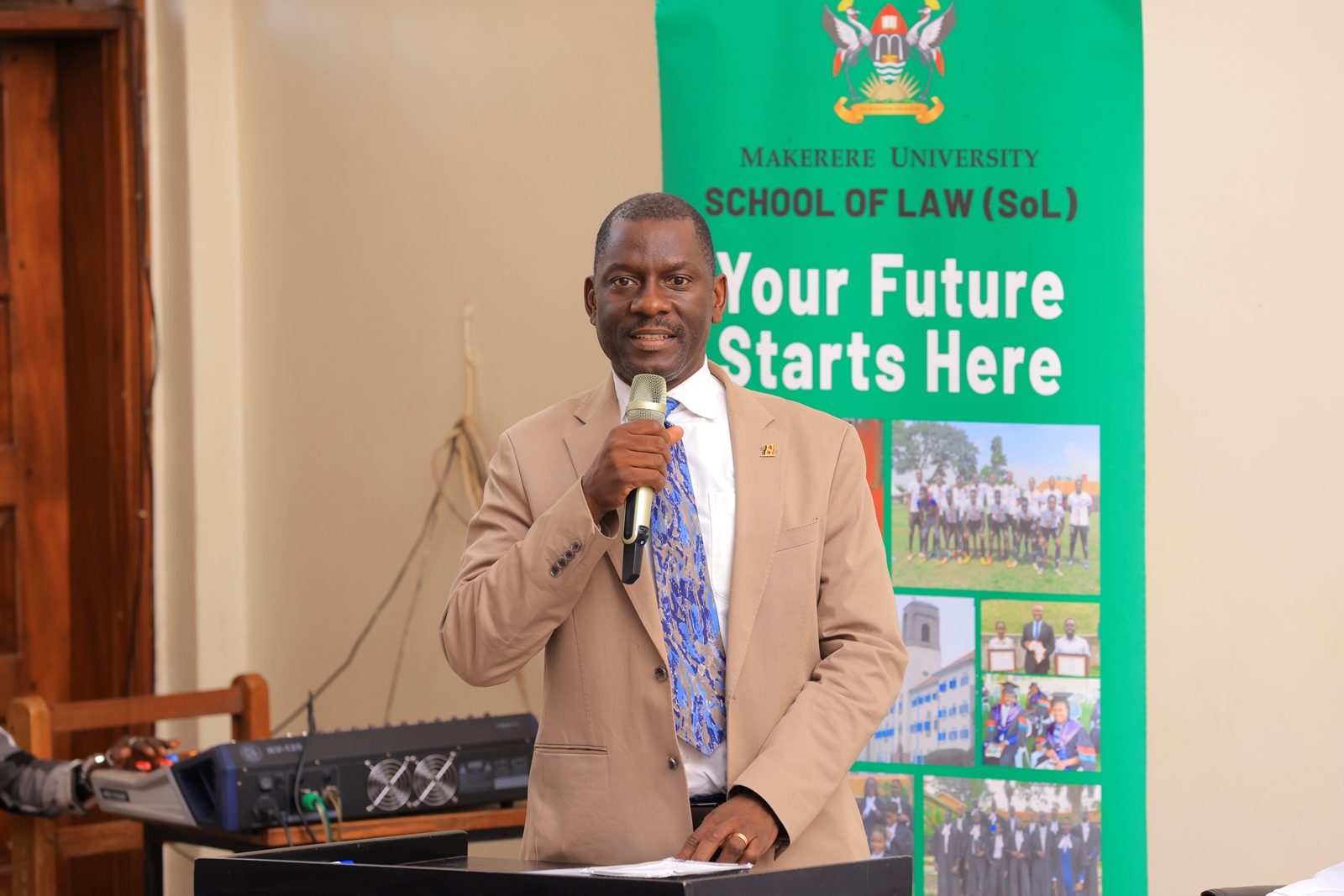
In his address to the students, Assoc. Professor Julius Kikooma, Director-Graduate Training welcomed scholars to Makerere University, a place of knowledge, discovery and transformation. He said, “we are thrilled to have you join our vibrant and dynamic community of scholars at one of Africa’s leading research universities. Your decision to pursue graduate studies here reflects your courage to lead, your passion to learn, and your desire to contribute meaningfully to your field and to society at large”.
Assoc. Professor Kikoma reminded the students that graduate studies are more than a degree, it is a lifeblood of a nation’s vitality and driver of its socio-economic transformation. He added, “graduate research is a strategic national asset, not just about producing knowledge for knowledge’s sake but generating insights, innovations and solutions that: respond to pressing societal challenges and inform evidence-based policy”.
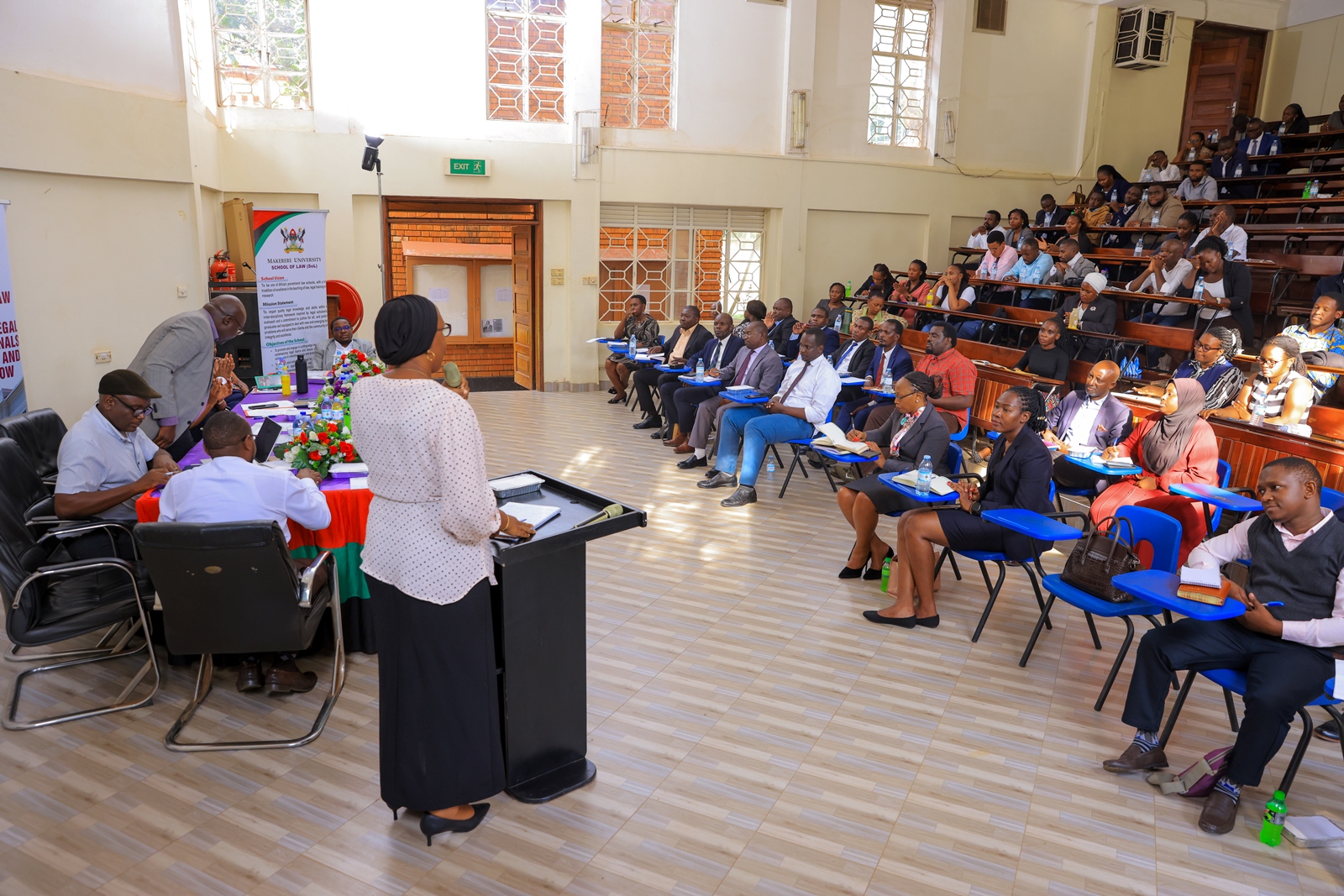
He encouraged the students that as they make choices for their dissertations to select topics that will contribute to Uganda’s Vision 2040 and the forthcoming National Development Plan IV.
A question-and-answer session followed where students sought clarifications on presentations from the various speakers.
Trending
-

 General1 week ago
General1 week agoAptitude Exam (Paper 1) Results for the Mature Age Entry Scheme 2026/2027
-

 Health2 weeks ago
Health2 weeks agoHow Jimmy Osuret Turned Childhood Trauma into Evidence for Safer School Crossings
-

 General1 week ago
General1 week agoFor Youth by Youth – Call for Second Cohort Applications
-

 Health2 days ago
Health2 days agoUganda has until 2030 to end Open Defecation as Ntaro’s PhD Examines Kabale’s Progress
-

 Health1 week ago
Health1 week agoCall for Applications: Short Course in Molecular Diagnostics March 2026
